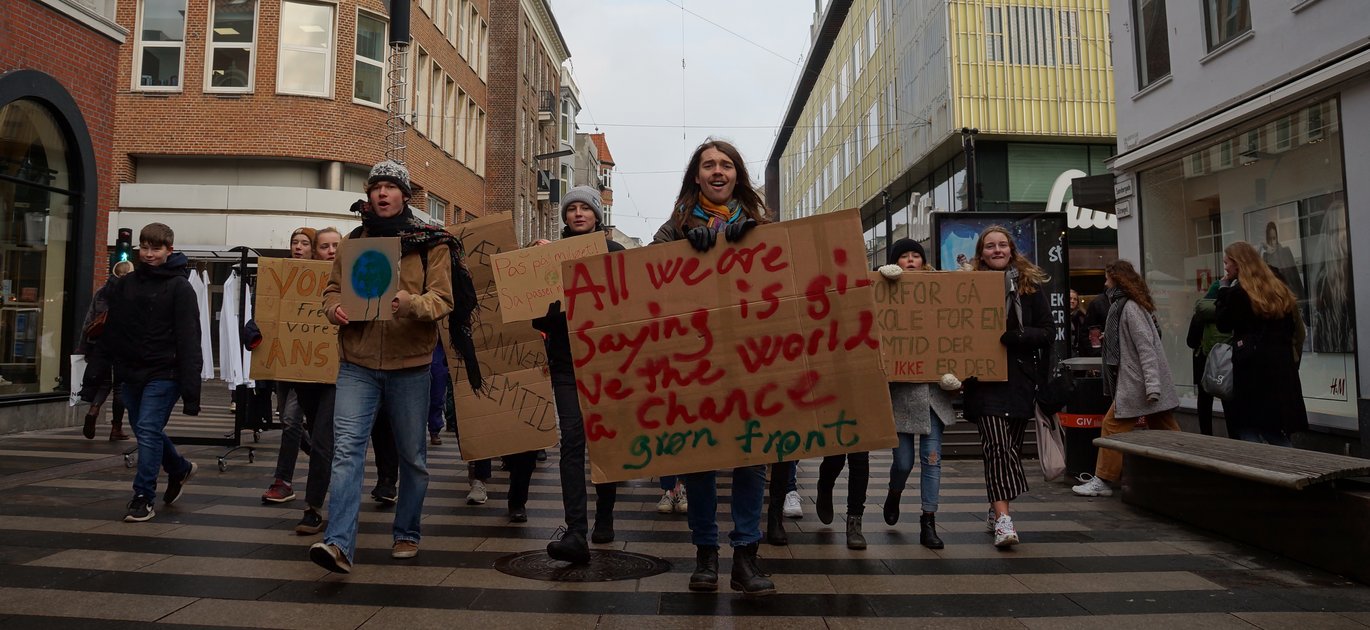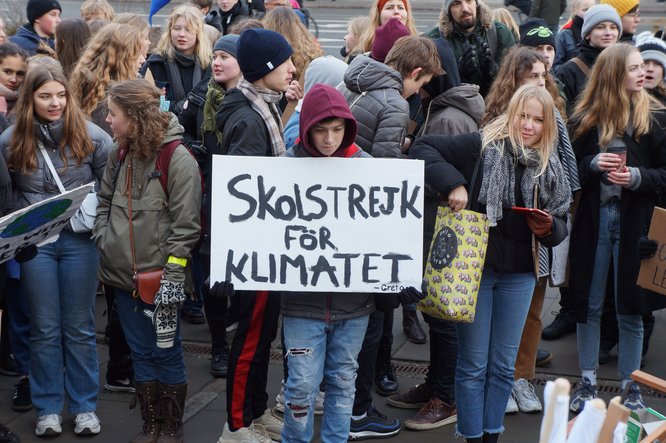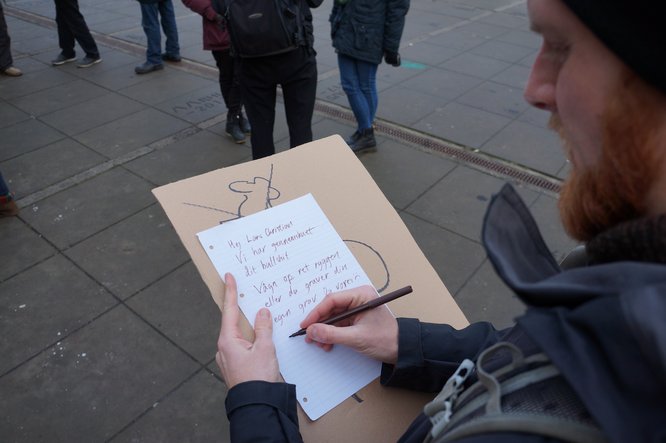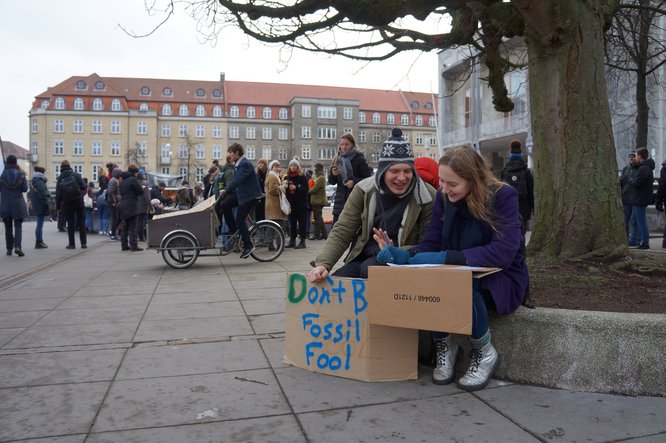A car-free campus? A ban on plastic cups? The Green Student Movement has wind in its sails – but still isn’t sure where it’s going
The climate must set the agenda. This is the message of the Green Student Movement, which co-organised a national climate strike today in several Danish cities. But what exactly the movement is fighting for isn’t entirely clear yet. On the other hand, AU researcher Mikael Skou Andersen’s speech at the strike was extremely direct.

Translation: Lenore Messick.
About the Green Student Movement
The Green Student Movement (Den Grønne Studenterbevægelse) was founded by students from different Danish institutions of higher education. The movement’s goal is to encourage a greater focus on climate change.
The movement began in Copenhagen in the spring of 2018, in Odense in November 2018, and in Aarhus in December 2018, when about 100 people came to a start-up meeting.
The movement is not organised as a formal association. There is no chair, and it is difficult to get a sense of its size. At the time of writing, the movement’s national Facebook page has over 3,500 members, and the local Aarhus page has 562 members.
The movement is behind a number of initiatives, for example:
· The ‘climate reminder’ in front of the Danish Parliament every Thursday
· The demonstration ‘Human chain around Christiansborg’
· Letters to Lars Christian Lilleholt, Minister for Energy, Utilities and Climate
· Involvement in the petition ‘Climate letter to the universities’, a call to universities to reduce their CO2 emissions and put a halt to all research on fossil fuels. The letter was presented to the senior management team at AU in December 2018.
· In Aarhus, the movement holds ‘climate reminders’ in front of City Hall on selected Wednesdays at 15:30 pm, right before the city’s technical committee meetings.
· The next climate strike will take place on 15 March.
The Green Student Movement co-organized today’s climate strike, which was for all young people, from primary school age and up.
“What do we want?” shouts a young man.
“Climate justice,” roars the crowd, as it moves quickly down Aarhus’ pedestrian shopping street. Older passersby stop up and stare.
“When do we want it?” shouts the man in front.
“Now!”
There’s a climate strike in Aarhus today. Over 1200 people indicated their interest on Facebook, and almost 300 signed up to participate. In reality, the flock of demonstrators on the street and in front of the City Hall consists of about 120 people – a mixed group of mainly schoolchildren, some university students and other groups, including Grandparents’ Climate Action, which brought up the rear of the procession.
The Green Student Movement, which was started by post-secondary students, is one of the organisations behind the event. The movement founded a local chapter in Aarhus last year, and in the course of just a couple of months, it already has a long list of events to its name. The climate strike, a series of demonstrations they call a ‘climate reminder’, which are aimed at the municipality’s Technical Committee, and several petitions, including a petition to the senior management team at AU calling for a more climate-conscious university.
But what does the movement want to achieve?
Room to imagine...
Kristina Jungdal Nielsen, a fourth-semester history of ideas student, is one of the founding members of the movement’s Aarhus chapter. She is now a member of the steering committee, and explains:
“We don’t support a particular party, and we’re not going to run in the university elections at AU. Because it’s important that the green agenda is for everyone.”
Do you all agree on what you’re fighting for?
“We’ve touched on that a little at our meetings, but we’ve mostly talked about how to get our message out. The only thing we’ve decided is that we’re against violence.”
But what is your message?
“We want to make the decision-makers aware that the climate is really important to students, and that we want to be heard too,” Nielsen says.
So you haven’t clarified what you want us to do differently as a university or as a society?
“No, we’re not that concrete right now. That needs to happen, but here at the beginning we have to make it easy to join the organisation. Right now, there has to be room for people to dream and think big: Imagine if we were CO2 neutral. Imagine if we didn’t drive our cars on Sundays. And imagine if downtown Aarhus was car-free. It has to be ok right now to say things like that before we sit down and start looking at what’s possible. And what we as a society can afford.” AU researcher:
Om tractors, planes and government policy
Climate researcher Mikael Skou Andersen spoke in front of City Hall at the climate strike. And he didn’t mince his words:
 Researcher Mikael Skou Andersen spoke at the strike today.
Researcher Mikael Skou Andersen spoke at the strike today.
“I started teaching about the climate before you were born, and I think it’s cool that you’re here,” he began.
“Unfortunately, neither the current nor the previous government have made the right decisions. They’ve lowered the price of fuel – and made it cheaper to pollute,” said Andersen, who teaches environmental policy analysis at the Department of Environmental Studies.
Agriculture also comes in for criticism:
“Do you know how far a tractor can run on one liter?” he asks the crowd.
There’s silence, and he answers.
“It can run one kilometer per one liter diesel.”
Almost everyone in the crowd boos loudly.
Andersen wraps up his speech by attacking aviation:
“If air transport was a country, it would be the seventh largest emitter of CO2. Other countries have imposed levies on air transport, and we have to do that too,” he says.

Encouragement to strike?
The political party the Alternative encouraged schoolchildren to participate in the climate strike, which was heavily criticized by the Danish People's Party’s Søren Espersen.
Climate researcher Mikkel Skou Andersen has no doubts about where he stands on that matter:
“I haven’t encouraged them do to it, but I think it’s a brave initiative, and they’ll make up that school day fast,” he says.
As a teacher and researcher, have you always been so outspoken about where you stand on climate policy?
“I have to be. Because we have to make the transition to be able to handle climate change.”

John Lennon and dreams
It’s now time for a singalong in front of City Hall, and a young woman shouts into a megaphone:
“Do you all know John Lennon’s ‘Imagine’?
Only a few voices shout back a hesitant ‘yes’. And when the song begins, it’s clear that the demonstrators are probably too young to know the lyrics.
Another young woman takes over, but she has to keep her eyes glued to the lyrics of the song, which she’s found on her mobile phone.
Greening the university
It’s not clear what specific changes the Green Student Movement wants to promote in the name of saving the climate. But on her own account, Kristina Jungdal Nielsen is happy to list a variety of things we should do differently at AU. First, putting an end to the cafeteria’s food waste, to plastic cups and paper plates, and offering more vegetarian options. As well as an awareness among researchers of the importance of flying less. Waste sorting at the university, and not least more openness about where AU’s energy supply comes from:
“Does everything just run on coal? We have no idea,” she says, and underscores that all students should be able to take climate-related courses – regardless of degree programme.

Fakta: Den Grønne Studenterbevægelse
Den Grønne Studenterbevægelse er skabt af studerende fra forskellige videregående uddannelsesinstitutioner, og vil have mere fokus på klima.
Bevægelsen begyndte i København i foråret ’18, i Odense november ’18, og i Aarhus december ’18, hvor omkring 100 personer kom til opstartsmødet.
Den er ikke opbygget som en forening med medlemmer. Der er altså ingen formand, og det er vanskeligt bestemme dens størrelse. I skrivende stund tæller bevægelsens landsdækkende side på Facebook dog flere end 3500 medlemmer, og lokalsiden for Aarhus 562 medlemmer.
Bevægelsen står bag flere initiativer blandt andet:
- Klimapåmindelsen hver torsdag ved Christiansborg.
- Demonstrationen ”Menneskekæde om Christiansborg” den 20. januar.
- Har sendt flere breve til klimaministeren.
- Involvering i underskriftindsamlingen ”Klimabrev til universiteterne”, der er en opfordring til universiteterne om at nedsætte deres CO2-udledning og stoppe alt forskning i fossile brændstoffer. Brevet er i december ’18 også blevet overrakt til universitetsledelsen på AU.
- I Aarhus afholder bevægelsen klimapåmindelser på Rådhuspladsen med jævne mellemrum. Forrige gang var der ifølge bevægelsen selv mødt omkring 100 demonstrerende op. Det sker på udvalgte onsdage klokken 15.30 – og altså lige inden kommunens teknisk udvalg afholder deres møde.
- Næste klimastrejke er den 15. marts.
Den Grønne Studenterbevægelse er medarrangør af dagens klimastrejke, der er for alle unge fra folkeskole-alderen og opefter.

